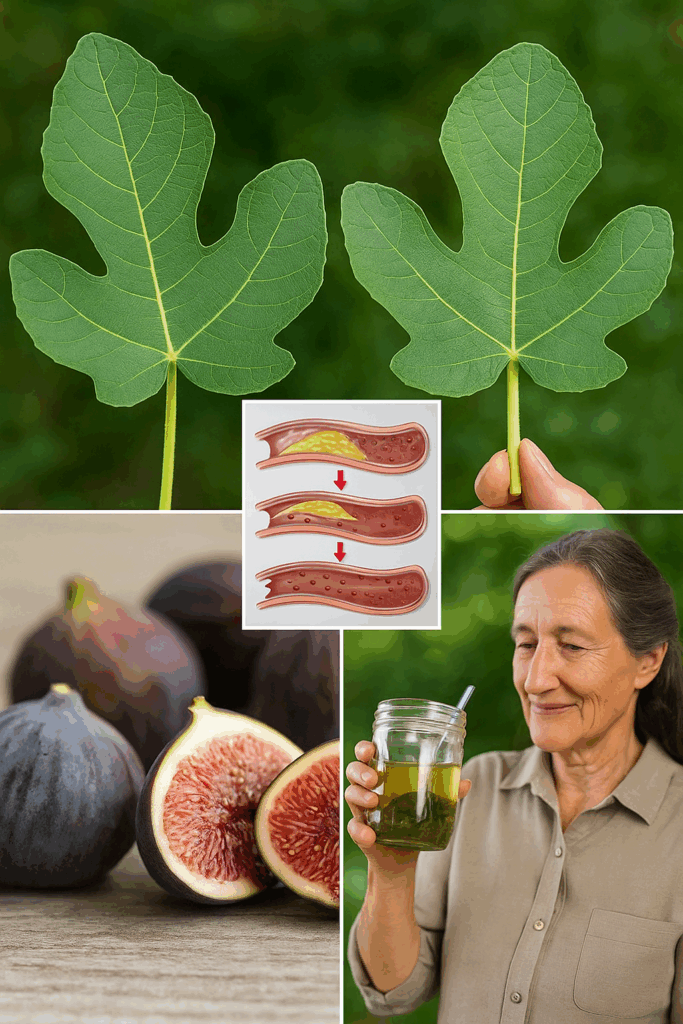When people think of the fig tree, the first thing that usually comes to mind is the sweet, juicy fruit. Yet the true secret of the fig tree may lie not in its fruit, but in its leaves. Fig leaves (Ficus carica) have a long history of use across the Mediterranean, the Middle East, and Asia, quietly supporting health and vitality for centuries.
Far from being just a backdrop to the fruit, fig leaves offer a range of powerful health benefits that modern science is only beginning to rediscover. Let’s explore the remarkable ways fig leaves can support your health and how you can safely incorporate them into your daily routine.

🌱 Why Fig Leaves Deserve More Attention
Rich in bioactive compounds, fig leaves contain antioxidants, flavonoids, and anti-inflammatory agents that support blood sugar balance, cardiovascular health, liver detoxification, and much more. Whether brewed into tea, powdered for smoothies, or infused into oils, fig leaves are an adaptable natural remedy for many modern health challenges.
🌟 Top 10 Powerful Health Benefits of Fig Leaves
🩸 1. Natural Support for Type 2 Diabetes and Prediabetes
Fig leaves have been widely studied for their ability to regulate blood sugar levels. Compounds in the leaves may enhance insulin sensitivity and reduce post-meal glucose spikes.
How it helps:
Drinking fig leaf tea or using extracts can help lower blood sugar, reduce insulin resistance, and support better long-term metabolic control.
How to use:
Enjoy fig leaf tea once or twice daily, ideally before or after meals. You can also add fig leaf powder to smoothies or use capsules under professional guidance.
❤️ 2. Helps Manage High Blood Pressure
Fig leaves contain natural compounds that help relax blood vessels, promoting smoother circulation and reducing oxidative stress.
How it helps:
By easing vascular tension and boosting antioxidant defenses, fig leaves help support heart health and lower blood pressure.
How to use:
Drink fig leaf tea consistently or sprinkle dried fig leaf powder into foods or smoothies.
🧹 3. Supports Liver Detoxification and Fatty Liver Recovery
Traditional and modern uses point to fig leaves’ ability to reduce fat accumulation in the liver and support healthy liver function.
How it helps:
Antioxidants and anti-inflammatory compounds assist in detoxification and may help reverse early-stage non-alcoholic fatty liver disease (NAFLD).
How to use:
Drink a cup of fig leaf tea daily and consider combining it with liver-supportive herbs like milk thistle or dandelion.

🔥 4. Eases Acid Reflux, GERD, and Heartburn
The natural mucilage and calming compounds in fig leaves can soothe the digestive tract, reducing irritation from stomach acids.
How it helps:
Fig leaves act as a digestive tonic, calming inflammation and easing reflux symptoms naturally.
How to use:
Sip warm fig leaf tea after meals to support digestion and reduce heartburn flare-ups.
🦵 5. Reduces Joint Pain and Inflammation
Fig leaves contain powerful anti-inflammatory agents that help relieve joint pain, swelling, and stiffness.
How it helps:
By reducing internal inflammation, fig leaves offer support for arthritis, rheumatic conditions, and general body aches.
How to use:
Apply fig leaf-infused oil topically on sore joints or drink fig leaf tea to support internal healing.
😴 6. Promotes Relaxation and Better Sleep
Fig leaves possess mild sedative properties that can help calm the nervous system and support restful sleep.
How it helps:
By promoting nervous system relaxation, fig leaves can ease the transition into sleep and improve sleep quality over time.
How to use:
Enjoy a cup of fig leaf tea 30 to 60 minutes before bedtime. Add chamomile or raw honey for extra soothing effects.
🍃 7. Improves Digestion and Reduces Bloating
Fig leaves support digestive function by encouraging enzyme production and reducing intestinal gas.
How it helps:
They help improve nutrient absorption, reduce fermentation in the gut, and ease uncomfortable bloating.
How to use:
Drink fig leaf tea after large meals or blend fig leaf powder into digestive-friendly smoothies.
🧴 8. Helps with Skin Conditions like Eczema, Psoriasis, and Acne
When used topically, fig leaf extracts can soothe skin inflammation and reduce bacterial activity on the skin’s surface.
How it helps:
Fig leaves help calm irritated skin, promote healing, and reduce redness and breakouts.
How to use:
Apply a cooled fig leaf infusion with a cotton pad to affected areas, or massage fig leaf-infused oil into dry or inflamed skin.
🧘 9. Reduces Stress and Anxiety
Fig leaves contain natural compounds that nourish the nervous system, helping manage stress and mood imbalances.
How it helps:
By supporting adrenal health and promoting relaxation, fig leaves can enhance emotional resilience and reduce mild anxiety.
How to use:
Drink a daily cup of fig leaf tea and pair with relaxation techniques like deep breathing or evening meditation.
⚖️ 10. Supports Weight Management and Reduces Belly Fat
By regulating blood sugar, supporting liver detox, improving digestion, and reducing inflammation, fig leaves contribute to a healthier metabolism.
How it helps:
Fig leaves may help curb cravings, prevent blood sugar spikes, and promote a leaner midsection over time.
How to use:
Incorporate 1–2 cups of fig leaf tea into your daily routine alongside healthy eating and regular exercise.
🍵 How to Use Fig Leaves at Home
✅ Fig Leaf Tea
Boil 3–5 dried fig leaves or 1–2 teaspoons of crushed leaves in 2–3 cups of water for 10 to 15 minutes. Strain and drink warm. Enjoy up to two cups daily.
✅ Fig Leaf Powder
Dry fig leaves thoroughly and grind into a fine powder. Add a quarter teaspoon to smoothies, yogurt, or mix into homemade energy bars.
✅ Topical Fig Leaf Infused Oil
Steep dried fig leaves in olive, coconut, or jojoba oil for two to three weeks. Strain and use the infused oil for moisturizing skin, calming inflammation, or massaging into sore joints.
✅ Soothing Fig Leaf Bath
Add a handful of dried fig leaves to your bathwater for a calming, anti-inflammatory soak that benefits both skin and joints.
⚠️ Important Precautions When Using Fig Leaves
While fig leaves are generally safe when used properly, they are potent and require mindful use.
🌿 Some individuals may experience mild allergic reactions or digestive upset if consumed in excess.
🌿 Avoid use during pregnancy or breastfeeding without professional supervision.
🌿 Fig leaves can interact with medications for blood sugar, blood pressure, or liver conditions. Always consult a healthcare professional if you are on medication or managing chronic health issues.
🚨 Disclaimer
This article is for informational purposes only and does not replace professional medical advice. Always consult a qualified healthcare provider before beginning any new herbal regimen, especially if you have existing health conditions or take prescription medications.
🌟 Unlock the Natural Healing Power of Fig Leaves
Whether you are seeking support for blood sugar management, liver health, digestion, or glowing skin, fig leaves offer a natural, affordable way to enhance your wellness routine. With their rich history in traditional medicine and growing scientific support, fig leaves stand as one of nature’s most underrated allies 🌿✨
Incorporate fig leaf tea, powder, or oil into your lifestyle and experience the gentle, powerful benefits of this ancient herbal remedy.


